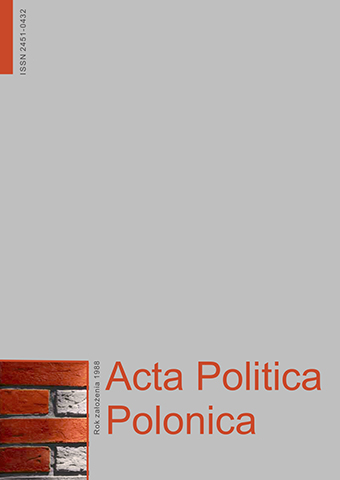
ISSN: 2451-0432
OAI
DOI: 10.18276/ap.2018.44-03




Lista wydań /
2/2018 (44)
Cybersecurity as a challenge for modern state and society
(Cyberbezpieczeństwo jako wyznanie dla współczesnego państwa i społeczeństwa)
| Autorzy: |
Marek
Górka
Politechnika Koszalińska, Wydział Humanistyczny |
| Słowa kluczowe: | polityka bezpieczeństwa cyberbezpieczeństwo cyberprzestrzeń cyber power cyber konflikt |
| Data publikacji całości: | 2018-06-30 |
| Liczba stron: | 11 (29-39) |
Abstrakt
Internet dynamizuje życie społeczne i polityczne poprzez zwiększenie dostępu do informacji,
ułatwia dyskusje polityczne, rozwój sieci społecznościowych oraz oferuje alternatywne
i dogodne miejsca do zaangażowania politycznego. Praca skupia się na analizie struktury
politycznej Internetu. Położony zostaje akcent na zrozumienie teoretycznych relacji między
technologią i polityką. To także próba odpowiedzi na pytanie o to, czy Internet odpowiada
na zaistniałe potrzeby społeczno-polityczne, oraz o to, czy istnienie Internetu może
mieć negatywny wpływ na życie polityczne. Aby zrozumieć współczesne wydarzenia,
należy zrozumieć specyfikę cyberprzestrzeni, która stanowi z jednej strony kontynuację
rzeczywistości, a z drugiej daje nową tożsamość uczestnikom życia społecznego.
Pobierz plik
Plik artykułu
Bibliografia
| 1. | Borandi, T. (2009). Introduction to Secure Global Collaboration. Information Security Journal. A Global Perspective, 2 (18), 51–56. DOI: 1080/19393550902791473. |
| 2. | Brantly, A.F. (2014). The Cyber Losers. Democracy and Security, 2 (10), 132–155. DOI: 10.1080/17419166.2014.890520. |
| 3. | Burton, J. (2015). NATO’s Cyber Defence. Strategic Challenges and Institutional Adaptation. Defence Studies, 4 (15), 297–319. DOI: 10.1080/14702436.2015.1108108. |
| 4. | Carr, M. (2016). US Power and the Internet in International Relations. The Irony of the Information Age. New York: Palgrave Macmillan. |
| 5. | Choucri, N., Madnick, S., Ferwerda, J. (2013). Institutions for Cyber Security. International Responses and Global Imperatives. Information Technology for Development, 2 (20), 96–121. DOI: 10.1080/02681102.2013.836699. |
| 6. | Clarke, R.A. (2012). Cyber War. The Next Threat to National Security and What to Do About It. New York: Ecco Press. |
| 7. | The Economist (2010). Cyberwar. The Threat from the Internet. Pobrane z: http://www.economist.com/leaders/2010/07/01/cyberwar (12.08.2016). |
| 8. | Deibert, R.J., Rohozinski, R. (2010). Risking Security. Policies and Paradoxes of Cyberspace Security. International Political Sociology, 1 (4), 15–32. DOI: 10.1111/j.1749-5687.2009.00088.x. |
| 9. | Isenberg, D. (1999). A Cyber Pearl Harbor? More Hype Than Threat. Pobrane z: https://www.joc.com/cyber-pearlharbor-more-hype-threat_19991227.html (12.058.2016). |
| 10. | Jensen, M.J., Danziger, J.N., Venkatesh, A. (2007). Civil Society and Cyber Society. The Role of the Internet in Community Associations and Democratic Politics. The Information Society, 1 (23), 39–50. DOI: 10.1080/01972240601057528. |
| 11. | Junio, T.J. (2013). How Probable is Cyber War? Bringing IR Theory Back In to the Cyber Conflict Debate. Journal of Strategic Studies, 1 (36), 125–133. |
| 12. | Mazanec, B.M., Thayer, B. (2016). Deterring Cyber Warfare. Bolstering Strategic Stability in Cyberspace. New York: Palgrave Macmillan. |
| 13. | Messmer, E. (2012). Stuxnet and Flame share code, development teams. Kaspersky Lab Says Early Version of Stuxnet Has a Flame Module. Network World. Pobrane z: https://www.networkworld.com/article/2189257/security/stuxnet-and-flame-share-code--development-teams.html (12.08.2016). |
| 14. | Cybersecurity Policy (2008). National Security Directives George W. Bush Administration, 54. Pobrane z: https://fas.org/irp/offdocs/nspd/nspd-54.pdf (12.08.2016). |
| 15. | Nye, J.S. (2011). The Future of Power. New York: PublicAffairs. |
| 16. | Oates, B. (2001). Cyber Crime. How Technology Makes it Easy and What to Do About it. Information Systems Management, 3 (18), 92–96. DOI: 10.1201/1078/43196.18.3.20010601/31295.12. |
| 17. | Ormrod, D., Turnbull, B. (2016). The Cyber Conceptual Framework for Developing Military Doctrine. Defence Studies, 3 (16), 270-298. DOI: 10.1080/14702436.2016.1187568. |
| 18. | Peterson, D. (2013). Offensive Cyber Weapons: Construction, Development, and Employment. Journal of Strategic Studies, 1 (36), 120–124. DOI: 10.1080/01402390.2012.742014. |
| 19. | Richards, J. (2016). Cyber-War. The Anatomy of the Global Security Threat. New York: Palgrave Macmillan. Rid, T. (2012). Cyber War Will Not Take Place. Journal of Strategic Studies, 1 (35), 5–32. DOI: 10.1080/01402390.2011.608939. |
| 20. | Rid, T., McBurney, P. (2012). Cyber-Weapons. The RUSI Journal, 1 (157), 6–13. DOI: 10.1080/03071847.2012.664354. |
| 21. | Roberts, L.D., Indermaur, D., Spiranovic, C. (2013). Fear of Cyber-Identity Theft and Related Fraudulent Activity. Psychiatry, Psychology and Law, 3 (20), 315–328. DOI: 10.1080/13218719.2012.672275. |
| 22. | Schroefl, J., Kaufman, S.J. (2014). Hybrid Actors, Tactical Variety. Rethinking Asymmetric and Hybrid War. Studies in Conflict & Terrorism, 10 (37), 862–880. DOI: 10.1080/1057610X.2014.941435. |
| 23. | Simpson, B., Murphy, M. (2014). Cyber-Privacy or Cyber-Surveillance? Legal Responses to Fear in Cyberspace. Information & Communications Technology Law, 3 (23), 189–191. DOI: 10.1080/13600834.2014.978551. |
| 24. | Summers, Ch. (2015). Hacking group Anonymous declares ‘Cyber War’ on Turkey for ‘Supporting ISIS’. Daily Star, 23 grudnia. |
| 25. | Thomas, T. (2014). Creating Cyber Strategists. Escaping the ‘DIME’ Mnemonic. Defence Studies, 4 (14), 370–393. DOI: 10.1080/14702436.2014.952522. |
| 26. | Trim, P., Upton, D. (2016). Cyber Security Culture. Counteracting Cyber Threats through Organizational Learning and Training. London–New York: Routledge. |
| 27. | Vacca, W.A. (2011). Military Culture and Cyber Security. Global Politics and Strategy, 6 (53), 159–176. DOI: 10.1080/00396338.2011.636520. |